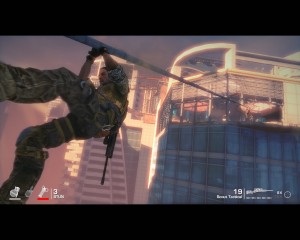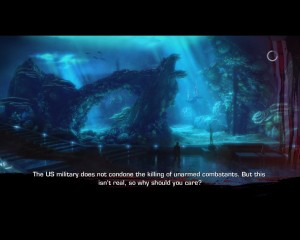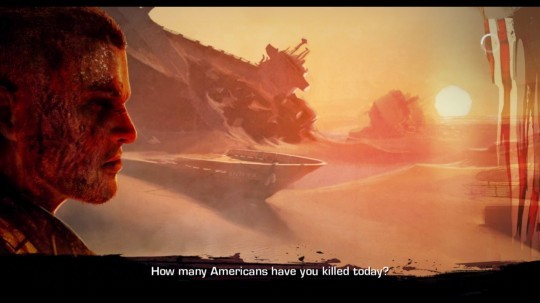Every year we have another military shooter come out and 2012 was no exception. With the rising popularity of series like Call of Duty and Battlefield, more and more developers are trying to cash in on the military craze.
So far we haven’t seen anyone able to topple the 800 pound gorilla of Call of Duty and their latest title: Black Ops 2, once again set record breaking sales for the year.
However, while most games are attempting to emulate Call of Duty for success, Spec Ops: The Line by Yagar Development had a completely different reason and may be one of the most thought provoking games that no one played this year.
A Sandy Tomb
Spec Ops: The Line starts out innocently (for a military shooter) enough, you play as Delta Force Operator: Captain Walker. Six months ago Dubai was hit by a massive sandstorm decimating the city. The US force stationed there: the 33rd were ordered to retreat and their commander: John Konrad disobeyed and stayed with his troops to protect the city.
Walker and his two other squad members have been ordered to recon Dubai, after a radio transmission from Konrad got out. Their mission was to determine the status of Dubai and rescue any survivors. What they find is that the 33rd have taken over and declared martial law, fighting in the streets and Konrad at the center of it all.
First I really have to give credit to the artists who recreated Dubai for the game. The environments especially from on top of buildings look amazing and the whole city has this almost alien like feel to it as it has been hit by so many sandstorms.
The gameplay of Spec Ops: The Line is your usual cover based affair. It only takes a few shots for an enemy to put you in critical condition and while your squad mates can be picked back up, you can’t.
Taking place in a city hit by sandstorms does give the player a few unique tactics to use. Glass holding back sand can be shot out to bury enemies and any grenades thrown on the sand can kick it up and create a temporary smoke screen.
Your two squad mates can be ordered to shoot enemies for you and can be helpful in drawing fire as you try to get into position to take out enemies.
And that’s the majority of the gameplay as the designers were striving for that average design seen in cover based shooters, but then things get weird.
Line Crossed:
As you move further into Spec Ops: The Line, the familiar story tropes of military shooters begin to fade away. The biggest would have to be the pro American aspect. In most shooters all the people you are killing are rationalized: corrupt officers, terrorists, criminals etc. In Spec Ops, you are going to go up to a man whose only crime was enlisting to defend American freedom, and blow his brains out with your gun.
The story, inspired by the book “Heart of Darkness” showed how easy for good ideas and men to become corrupted in the horrors of war. And as Walker and his squad move deeper into Dubai, their actions intensify. One of the culminating points that I won’t spoil here, is when Walker makes a choice that leads to one of the most chilling scenes I’ve ever seen in a video game.
The game explores the concept of Post Traumatic Stress Disorder as Walker and his squad become more unhinged as the game continues. And speaking of the game, even it becomes twisted as load screens change to fourth wall breaking messages.
“It’s another game rammed onto the disk like a cancerous growth, threatening to destroy the best things about the experience”
-Cory Davis: lead designer on Spec Ops The Line on the subject of the game’s multiplayer
Spec Ops: The Line by the end of it is almost a giant middle finger to both military shooters and the people who love them, as there is no moments of heroism, or pride in your actions. Instead the game does its best to make you take a hard look at the other side of what it means to go to war.
You can clearly tell that the designers knew what they doing with the design of the game to make a point. And honestly, I’m really surprised that it got made in the first place, or that more people haven’t been talking about it. As the game does its best to subvert your expectations of both military shooters and games in general.
One example is the use of choice in the game. In most games, choices are defined as good or evil and may influence the plot or the player’s path. In Spec Ops: The Line, every choice is between one horrible action, and another. They’re not used to change the story, or affect a morality slider, but instead are a test of the player.
The most disturbing things in Spec Ops: The Line are never truly in the player’s control. And I think the reason for that was to further remove the player as being Captain Walker and instead being an outside observer.
Now I’ve spent a lot of this post discussing the story over the gameplay and for good reason.
It’s common for games built around telling a story to suffer in the gameplay department and Spec Ops: The Line is no exception. The cover mechanic was very finicky, with times that I would leave cover for no reason.
The inclusion of “heavy troops”: men in full body armor and hard to kill felt very gamey to me, and removed the element of how vulnerable everyone is in the game.
There are multiplayer modes: death match and co-op that are very generic and interestingly enough the lead designer spoke out against. The game was definitely made to tell a single player story first and foremost and the majority of development time was given to it.
In the end Spec Ops: The Line isn’t going to win any Game of the Year awards, but it is one of the most important games to play this year. And to conclude this post on a shocking game, I have a question that the game asked me several times:





